Tim Hill's Memories
Edited extracts from the transcripts of interviews recorded by Roger Kitchen on 19th November 2014 and 17th December 2014
Timothy James William Hill came to Milton Keynes in 1977 and became the first Chief Superintendent of the newly created Milton Keynes Division of Thames Valley Police in 1980. After 30 years’ service with the police force, he retired in 1987 to become the first Chief Executive of Milton Keynes Community Trust (1987 – 2000) now Milton Keynes Community Foundation.
Tim also served the Rotary Club for many years throughout his life, becoming President of the Bletchley branch twice. He became Chair of Living Archive Milton Keynes in 2001 until his retirement in the summer of 2014, LAMK’s longest-serving Chair.
Tim died on 22nd May 2015 – ‘a much loved dad, grandad, brother and son-in-law; a greatly respected colleague and caring friend of many; a generous and kind man. He will be greatly missed.’
1. Before Milton Keynes
I was born on 26th May 1935 in Aldershot, Hampshire. My father – James William Hill – was a regular soldier, Warrant Officer Class 2, in the Royal Artillery. When the war was over dad left the army and became a postman. He died at 57 while I was doing my National Service overseas .My mother Winifred was one of a farming family of 12 and her father was originally the coachman for the big house – in Pewsey, just outside Amesbury in Wiltshire . My sister is six years older than me.
We moved to Salisbury at the outbreak of war. I went to St Mark’s Junior School at the top of the road… I remember my mother coming and dragging me in when we had an air-raid, but the greatest recollection I have of is of the bombers flying over on D-Day. I got into the Bishop Wordsworth Grammar school in Salisbury and finished my education in the Sixth Form at 18.
We were very strapped financially and I was conscious that we had to be careful with our pennies. So I had a paper round – I’d get 10/6d a week, 52½ pence for seven days a week getting up at half-past six! When I left school, I actually had £80 in my Post Office Savings Bank book – an incredible amount of money.
Mother was anxious that we should regularly attend church so we did.I sang in the choir in St Edmund’s church in Salisbury and would serve at Salisbury Cathedral because the school provided servers for the midweek communions.
I was in the Scouts and enjoyed that thoroughly. We had a wonderful Scoutmaster, who I owe an enormous amount to. He was a gardener in the big house outside Salisbury. He really got us senior scouts sorted out. He’d take us camping and we’d do obstacle courses over rivers and swinging from trees. We had a whale of a time.
When I left school, I had to do my National Service and was sent off to the Wiltshire regiment in Devizes. Whilst I was there, I was selected to go on a War Office selection board for a commission…. One of things you had to do was an obstacle course and you had to lead these teams over. Well, that’s what we’d been doing in the Scouts. So I could do all that.
On the third day you had an interview with a senior army officer – all retired guys, colonels and grey-haired. I went in and there was my CV all listed down. The chap sat there said:
‘Sit down, sit down. I see that you’re a Queen’s Scout?’
‘Yes sir.’
‘I was a personal friend of Baden Powell.’
So we spent half-an-hour reminiscing about all this, and suddenly he said,
‘Oh my word! I’ve got to fill this form in.’
He went tick, tick, tick, tick, tick, tick… and ticked off the boxes on the form and I was selected for a National Service commission!
I had 17 months in Benghazi – as a 19-year-old 2nd Lieutenant, in charge of a transport platoon with all the drivers being local Arabs, sharing a batman in the officer’s mess. This was 1953 when we were still in our colonial mode. We set the boundaries of what Libya then would be – it was Tripolitania and Libya – and we put King Idris on the throne. About a week before I was scheduled to leave somebody tried to shoot King Idris in Tripoli. That was the beginning of the turnover that led to Gaddafi, I suppose…
I was coming to the end of my two years in the army. My mother had longed for me to become a schoolmaster because that was a ‘very respectable job’ and I had made the first inroads into doing that – I had already got a place at a Teacher’s Training College. I’d enjoyed the army – being in charge of a platoon and all these men. The responsibility was absolutely enormous for that age. That helped give me a bit more character, I suppose. But I thought, Do I really want to go back to college for another two years?’ So I wrote to them and said ‘No, thank you.’
I came home and got a job with Marks & Spencer as a Trainee Manager. I was with them for a couple of years…
I’d had a hankering about the police. It might have been the uniform and discipline – I quite liked those. After I resigned (from Marks), I walked up to the old town police station in Swindon and there was a bobby, sitting with a rolled fag in his mouth and typing on an old Olivetti typewriter.
He said: ‘What can I do for you, young man?’
I said, ‘I want to join the police.’
‘You must be bloody mad,’ he said.
I went up to Headquarters in Devizes where I was interviewed. A couple of days later they wrote and said yes. Then I went off to Bridgend Police Training College in Wales.
My first job as a policeman was ‘a bobby on the beat’ in Chippenham – where I met Theresea. The first month you did permanent nights so that you could get to know the town. My mentor was Ron James, a senior constable who had been in the navy during the war. The first day we walked out of the station after the month’s nights, he said:
‘You got a girlfriend?’
I said, ‘No, no’ – I’d just had a ‘Dear John’ letter from my then girlfriend.
‘Oh,’ he said, ‘we’d better sort that out then.’
So we went up and down the High Street, in and out of the shops, looking at the various lasses who were there as assistants to see who would be suitable for me… and Theresea won! She was working in a little dress shop next to Woolworths, and that was a regular tea spot. She was courting somebody else at the time. We soon got shot of him…
I joined the Wiltshire Constabulary on the 25th February 1957, and on the 25th February ’59, two years later, we were married – on the strength of £1 a week pay rise.
I dragged the kids all over the place. Every two years in the first half of my service we moved because there were opportunities that I took. And Theresea, God bless her, followed, because her dad had been in the RAF and they’d moved a lot so she was used to it. It wasn’t too disruptive for her.
I was ambitious. When I was a Chief Inspector I went up to a promotion board for a Superintendent’s job. David Holdsworth – the Chief Constable then, a lovely man – leant across the table and said, ‘Now tell me, Chief Inspector Hill, what rank do you hope to achieve in the police service?’
I heard myself say, right out of the blue, ‘I shall be disappointed sir, if I don’t become a Chief Superintendent.’
He leant a bit further forward and said, ‘If you become a Chief Superintendent you’ll be bloody lucky.’ But he said it with a big grin on his face.
2. Coming to Milton Keynes
In 1977 I was sitting in my office in Cowley as the Superintendent in charge of the division which had Oxford United football ground in it There’s a knock on the door and in comes the Chief Constable (I’d been warned what he was coming for):
‘Good afternoon, sir.’ I stood up. ‘Do come and sit here.’
‘No, no, Tim. You sit… I’ll sit here.’
And then it was: ‘Lovely weather… had your holidays…?’
‘Now,’ he said. ‘I’m looking for someone to go to Milton Keynes as Deputy Divisional Commander.’
‘Yes, that’ll be fine, sir.’
‘Are you sure?’
And I said, ‘I’ve spoken to my wife and she’s getting the tea-chests out of the loft.’
And that was that.
I came up here and spent a fortnight on a camp bed in my office at Bletchley Police station because they wanted me up here and couldn’t move the family. So that’s how I came to Milton Keynes.
I was 42 in 1977; and the children were 17 (Jackie), 16 (Tim) and 11 (Lucy). I often felt quite guilty about how they were dragged from pillar to post and I’ve said that to them. They’ve said, ‘Well, we didn’t turn out badly, did we?’ They’re very generous, but I’ve said, ‘Don’t thank me for how you’ve turned out. Thank your mum because she shaped so much.’ I was there if needs be, but the day-to-day, organising the washing-up rota and stuff like that – that was down to Theresea, bless her.
People would say, ‘Milton Keynes is a wonderful place to come and live and then get lost in.’And it was. You didn’t know who your neighbours were. You didn’t have enough of a network of police officers to start fathoming out who’s what and what’s going on where. In those early days, we were walking around in a bit of a fog, almost blindfolded and, when something happened, you reacted but you couldn’t get to the stage where you were ahead of it. Not like the good old days in the village: when somebody broke into the village shop the village bobby would say, ‘This is Johnny Smith,’ and go round and say, ‘Johnny, come on.’ And that was that – you knew who it was who’d done it. Milton Keynes was a good place to get lost in, no question about that!
The thinking was that we wanted to give incomers the comfort of knowing that there was a bobby about – so that people had someone to relate to. There were lots of young mums with young kids and they needed somewhere to go and to be able to talk to somebody. It was much more of a community aspect in that regard.
I was able to make a study of policing on the Lakes Estate as part of my MSc degree (from Cranfield). I put a Policing Team onto the Lakes Estate- a Sergeant, a WPC and four bobbies. It worked extremely well because, in that year that it ran, the crime in Milton Keynes went up by 13%. On the Lakes Estate it didn’t increase at all. People seemed comfortable with a set body of bobbies they knew. In fact, when there was a hoo-ha at the pub on the Lakes and none of the local team were on duty, they sent a car from Bletchley. When we were looking into it the following day, one of the blokes from the pub said, ‘Well, it was alright if it had been the locals, but it was those blessed foreigners from Bletchley!’ That indicated that they liked a dedicated team of police.
I was the Founder/President of the Didcot Rotary Club, when I was the Chief Inspector there and they moved me to Cowley so I had to give that up. I was without Rotary for a year or so and then the Rotary contacted Stan Crump (my then boss in Milton Keynes) and asked him to come and give them a talk. He came into my office and said, ‘You can do that. I don’t want to go and give a talk.’
I said my few words and, as I was leaving I was invited to come again. And so I did. That’s how I joined and that was good because it gave me a link in to various, very interesting key folk locally.
Paul Harris founded Rotary in America. He was a lawyer and set it up in order to meet other business people. That was the whole purpose of it. They would go round – rotate around – each other’s business premises…hence Rotary.
It’s a great shame because internationally the Rotary does a fantastic job and I’m sure that there are Rotary clubs in the UK that are very vibrant and doing extremely well but, in general, in my view, the Rotary movement has not moved into the modern age. It still has too many restrictions. It’s trying to catch up a bit now.
A Brickhills club was formed seven or eight years ago now, part of a development of Rotary International Britain and Ireland. RIBI was looking for some fresh initiatives so they let this club meet once a month instead of once a week without having a formal lunch. They met in the evenings in a pub. And they were doing great things. They were young people with young families and had lovely Christmas carol services. But they put on gambling evenings and Rotary said, ‘No, we’re not going to permit that. You are no longer a Rotary club.’ And you thought, that’s a death wish, quite ridiculous.
These days in the UK it would be frowned upon if you joined a Rotary club in order to enhance your business. That doesn’t mean you wouldn’t do business with people there, but when the Rotary Club of Bletchley was founded you could only have one from each business, (like) one bank manager out of the town. If you were the one who was in the local Rotary club you were quite privileged, but that’s gone by-the-by now.
It was several years after that that Theresea joined Inner Wheel – I was President at the Rotary Club and she was President of the Inner Wheel!
3. Being Chief Superintendent of Milton Keynes
I became Chief Superintendent of Milton Keynes in 1980. Stan Crump went on to become the Deputy Chief Constable of Cambridge which made a vacancy. He went to the Chief Constable, Peter Imbert. I suppose Peter Imbert says, ‘ What do you reckon?’ And Stan says, ‘Well, yes. He’d do a good job.’ And it was as simple as that. I was just called up by Headquarters and congratulated and that was that.
I was very fortunate in Milton Keynes because Peter Imbert came to address a number of business people from Milton Keynes. He said, in front of all, ‘Tim Hill is the Chief Constable of Milton Keynes. That’s how you should regard him.’ That was a tremendous boost to me: for him to say that so publicly added very much to my ability to get things done. I actually planned the policing of Milton Keynes and sent my recommendations up to Peter Imbert, who’d say, ‘Get on with it. If I don’t like it I’ll tell you but get on with it.’ So you had that sort of carte blanche. I’d say: ‘Charlie Green, I want you to be the bobby looking after the Shopping Centre. That’s your job.’ And: ‘Johnny Smith, I want you to work out of that community centre.’ Peter would say, ‘We’re opening a new bunch of houses’ and I was able to slot somebody in there to get it rolling. So the locals would see that there was a bobby who had interest in what was going on.
I worked closely with the Development Corporation and the Council. In fact, when we first started the new policing of Milton Keynes, having had my plans approved, I addressed the Council and made a point of being seen and people knowing me and being open to people to contacting me.
We were fairly crime-free in the initial stages because we were a new gathering of folk. There were some domestic disputes going on because a lot of people were relocated here – which in those we didn’t take as seriously as we should have done or as they do now. It was long before there was a Women’s Refuge…
The whole thing was so new and developing so rapidly. I remember walking around the Shopping Centre open-mouthed and thinking, Good Lord – how are we going to police this? I was conscious of the fact that they were always short of men. Once, when Her Majesty’s Inspector of Constabulary came on his annual Inspection of the Force, Milton Keynes was one of the places he came to. The Development Corporation gave him a lovely lunch and we were all chatting… The HMI report came back to the Force saying that he had approved an increase of five Constables for the Force area, all of whom were to be posted to Milton Keynes. One of the other Chief Superintendents said, ‘You crafty devil. How did you manage that?’ I said, ‘Give a good lunch!’…
Our police horses from Milton Keynes now go over the whole Thames Valley – for football, Windsor, even Royal Ascot. When they were building the new police station in CMK, it gave them an opportunity to include stables because there were none in Thames Valley. Nobody was trained for horses so we recruited a Sergeant in charge of it. He started a six-horse mounted unit from scratch -went across to Ireland to find them… In crowd situations they are very effective. They reckon a horse is worth 12 bobbies because of crowd control – people move because a horse is there and most like them; it’s good PR.
I was awarded the Long Service and Good Conduct Medal in 1982. That was what we used to call twenty-five years of undetected crime! I retired after 30 years’ service on March 22nd 1987.
4. Chief Executive of the Milton Keynes Community Trust, now Milton Keynes Community Foundation
After being with the police, I was looking for something more – another interest. What a lot of senior police officers do is work for the Ministry of Defence, researching, interviewing people on secret matters of security. I thought, ‘Well, I’ll have a go at that.’ I went up and was offered a post but towards the end of my time as Chief Superintendent, Peter Waterman – MKDC Director of Social Development, an unusual position in a new town – had asked me to become a Trustee of the MK Community Trust.
The development of Milton Keynes was enhanced more than in other new towns. I had met many times with Peter. He went to a Charities Aid Foundation in London where the guy who ran it had learned about community foundations in the States, and had persuaded the Government, somehow, to sponsor six of these in the UK. So Peter set one up for Milton Keynes and asked me if I’d be a Trustee along with (among others) Allen Duff (MKDC Commercial Director), Lady Tudor-Price, Malcolm Brighton (CE of DRS) and Cllr Betty Hanks…
Then I was offered this post with the Ministry of Defence – and simultaneously we reached a stage where we were able to employ a Chief Executive for the Community Trust. As Trustees, we were going through the job description and I thought, ‘I quite like the idea of that.’ So I applied for it, and was appointed- and turned down the Ministry of Defence.
We started off in Saxon Court in a tiny cubbyhole of a room. There was a desk, a chair and a telephone. We advertised for a part-time typist and off we went…
I realised that I was into a bigger game than I’d envisaged when a builder of a new estate wanted a bit of publicity. I think he’d been directed to us from the Development Corporation. He set off half-a-dozen marked firework rockets. The first person to bring one of them to his office would win some money. And they paid us £500 for using our name attached to that. I was thrilled to bits. I went to Peter Waterman and said, ‘Peter, we’ve got £500!’
And Peter said, ‘Only £500? Is that all they gave you?’
Then, we were looking for something like £5,000 to become a top-of-the-range member and £250 to be an individual member. For that, we told them we could take away from them any worry that they might have about all the various bids they were getting from different charities to support them by saying to those charities ‘We support the community through the Trust – they act on our behalf .’ One thing the Development Corporation did was to encourage a strong voluntary sector – there were lots of people looking for lots of money from lots of different businesses. We could centralise that.
I would go around to businesses because I’d only recently left the police and I was known … but I knew absolutely nothing about fundraising. I could chat a bit but that was about it. I saw this very pleasant German guy, in charge of Mercedes Benz at the time. I told him, as a member, his company’s name could be included on our notepaper. He said, ‘I think Mercedes Benz can probably manage without being mentioned on your notepaper.’ So that was something else that I learned.
I went to see Mr Watano, the head of the Japanese business community in Milton Keynes and Head of Alps Electric. He was a very pleasant man. He signed up and I sent an invoice. I got a phone call from Peter, the Director of the company: ‘I’m afraid you’ve upset Mr Watano.’
‘How have I done that, Peter?’
‘Well you sent an invoice for membership.’
‘Yes, but several businesses asked us to do that, because it was easier to pass through the books.’
‘Well,’ he said, ‘the Japanese’s attitude towards an invoice is that it is a debt and they do not consider giving to charity a debt. It’s alright. I’ve explained it to him but in future just please send a letter saying would you like to renew.’ So that was something else I learned.
Another interesting lesson was when the Charles Stewart Mott Foundation sent over people from America to here to give us some advice: a big Foundation would list all its donors in the annual report – even a guy who’d given one dollar. That was typical of their attitude – they recognised everybody… so that was how that came about.
There was obviously tension between County Councillors and the Development Corporation – although not between the officers of either side. They would get on perfectly well. But the County Council feared they would lose power because this other grant-making body would come in and usurp their authority. They saw us born out of the Development Corporation, whom they didn’t like. They used to call it ‘Millstone Keynes’ with this hostility between the County Council and Milton Keynes…
In those days there were still occasions when we were strapped for cash and the Development Corporation, through the Social Development Unit, would find the odd £5000 for us to put in the kitty to pay the salaries. So we weren’t in a position to employ many people, nor to offer fantastic salaries. That’s why, when I started that fund at the Community Foundation for Theresea, I specifically said that I wanted the fund to support the administrative costs.
I was looking for an idea to raise money and I thought, ‘Car raffle’. So I sat down and I worked out a very careful structure for my conversation that I would have with Volkswagen – they were giving us £10,000 a year. I’d got about two or three minutes into my spiel when Geoff (who was in charge at VW) leant forward and said,
‘You want us to give you a car to raffle, don’t you?’
‘Yes.’
‘Ok,’ he said. ‘We’ll give you a car and £5,000. How’s that?’
And that was how the car raffle started.
That was just amazing. It was a red letter day…
We were offered community sites – for scout huts, community centres, churches and so on. Downer Duff were doing all the letting and transfers – we’d always had a link with the property side. Allen Duff was a tremendous supporter in that respect. He really worked his socks off for us.
We had dances at Bletchley Leisure Centre. We’d go to Argos for the tombola prizes. They’d say ‘Choose a thousand pounds worth of goods and we’ll deliver them.’ Well, that was in the days when dances were still fashionable. The first one we did, we made £9000, but each year after it was harder. We reached the stage where the amount of effort wasn’t worth the return. it was a good way of getting people together and the first couple were brilliant. We had very good bands!
SNAPcame to us for funding and we gave them some. But (later) I was uneasy about the way it was being run… I’d met Peter Wilson by then who had given the occasional thousand. His daughter needed that kind of support and he went to have a look over it. He decided that he would turn that round and got his financial guy involved. That led to him moving SNAP onto where it now is.
The Margaret Powell Fund came to be within the Community Foundation after I got a letter from a solicitor in Towcester inviting us to make an application for lumps of money from a bequest – to go to several charities around Milton Keynes. Margaret Powell had been a sheep farmer at Tattenhoe Bare Farm and her land was purchased for £2 million. She had no close relations. She’d gone to him and said, ‘What am I going to do with £2 million?’ They came up with the idea of a Trust fund. I thought, ‘Crikey! £2 million as an endowment when you’re earning 10% – we don’t want to get rid of that and dribble it away.’ So I shot up to Towcester and saw this guy and said:
‘Look, why don’t you think in terms of investing it rather than just getting rid of it? Give it a name – the Margaret Powell Foundation – and let us operate it for you in the way that Margaret would have wanted, for disabled people. We’d be very happy to do that.’
There was a nephew of Margaret Powell, Roger Norman, and I persuaded them to come to one of our meetings to see how we go about making our grants. And that sold them the idea. Then I asked Bob Hill (MKDC Commerce Director) and Roger if they’d become Trustees because I knew that they’d get on well. And that’s how the Margaret Powell Foundation came to be.
***********
The Community Foundation was going to continue to grow and it needed a different approach. I’d been there 13 years and was perhaps looking to have a more relaxed life than to stay on. When I named Acorn House, where we moved to – I said, ‘It’s got to be Acorn, hasn’t it? From little acorns mighty oaks do grow…’
I believed that a strong Community Foundation would strengthen the whole of the voluntary sector because it could be the core funder for everybody. Some of the smaller charities could be supported by us when they may not be particularly popular. There are still people who say, ‘Brook Advisory Clinic? Good lord alive. Giving away contraceptives!’ We became successful underpinning the weaker aspects of the voluntary sector. That was an important element of a community foundation.
I’m proud of what we achieved because it was quite hard work to get it rolling.I was determined that when I left, it would have a strong board of Trustees. That’s why I got Peter Kara on board. I also wanted Mike Murray, Chair of Living Archive on board – he said it would be an honour and I thought, ‘Chief Executive of the Borough and he thinks it’s an honour to be a Trustee… Something must be going right!’Anyhow, I thought that if I relieved him of the Living Archive Chair, he would move onto the board. I hadn’t the faintest idea what was involved in Living Archive. Not a clue. Another learning curve!
Tim and Theresea Hill in France,
2005
Tim Hill on his birthday, May 2010
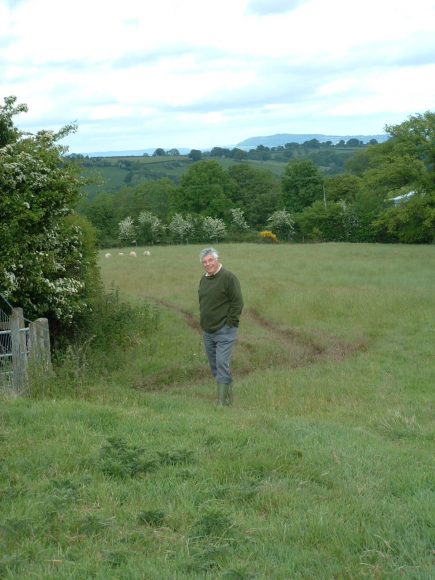
5. Chair of Living Archive Milton Keynes
Living Archive were such a bunch of enthusiasts with such a sheer determination to succeed against all odds. I liked that. You were constantly being challenged to do not quite the impossible but very nearly the impossible with limited resources. With the police you were called to account. The Foundation you were called to account by the Trustees. I was never called to account by Living Archive. But I just had that feeling that we couldn’t let it flounder. The Bath House is ever etched on my mind!
It’s been fascinating to see the way in which muddy fields turn into communities…
To have been the first to be able to design the policing for Milton Keynes, to be instrumental in setting up the Community Foundation and to help Living Archive keep their heads above water are three things that give me a tremendous pleasure.
Tim Hill (far right) with Living Archive staff and volunteers shortly after their move to MK Museum in 2013
During Tim’s Chairmanship (2001-2014), Living Archive collected an impressive number of honours and awards, both national and local. As well as being twice nominated for the Queen’s Award for Voluntary Service (2007, 2008) Living Archive’s credits include two national Best Documentary Films (2005 and 2007); the 2007 Special Award for Outstanding Achievement, ‘The Pride of Milton Keynes’; and the Community Beacon Award for IT Training (2009) – one of only 10 given by UK Online.
Some Living Archive projects during Tim Hill’s tenure as Chair 2001 -14
Bletchley Community Heritage Initiative – now in its 15th Year
45 Films made by and about young people (film-makers below) – including Crime Watch
Over 50 major exhibitions, including the resident Discover Milton Keynes in MK Central Library
12 new oral collections of MK people’s lives including ‘Asian voices’ and dementia sufferers
25 IT training courses to help people create local / family history web pages.
10 publications – including The MK Book of Days of the Great War (researchers below)
Tim at the opening of Discover Milton Keynes in Central Milton Keynes in May 2008 – the first of dozens of major exhibitions managed by Living Archive since – with the Mayor of Milton Keynes, Jan Lloyd

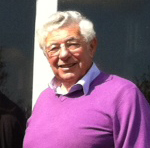
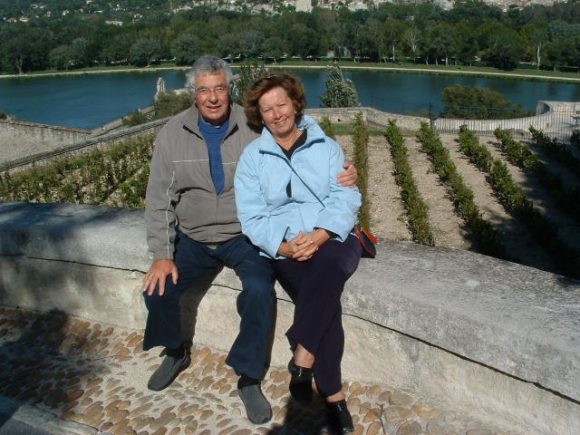
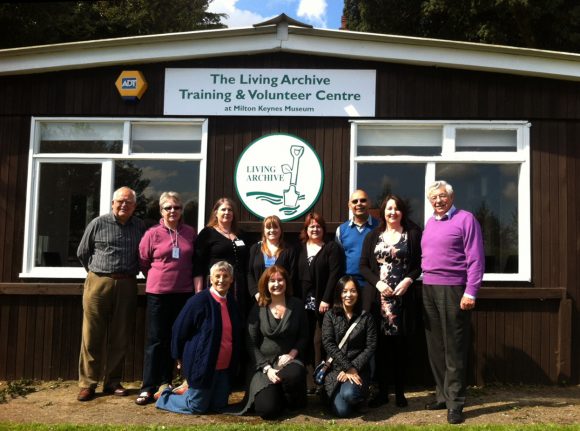
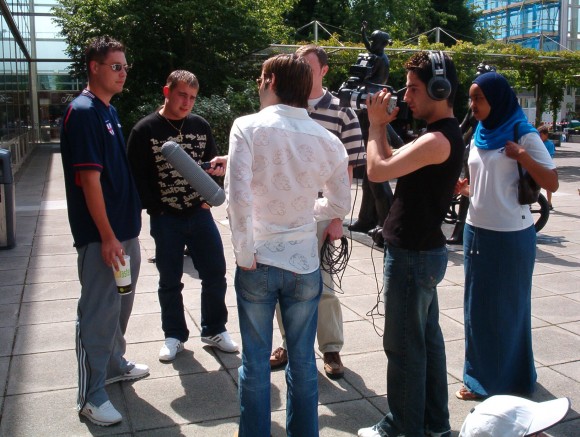
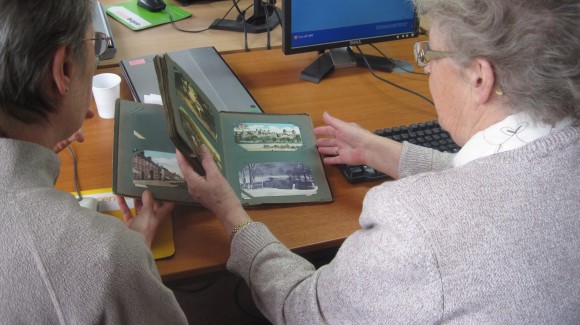
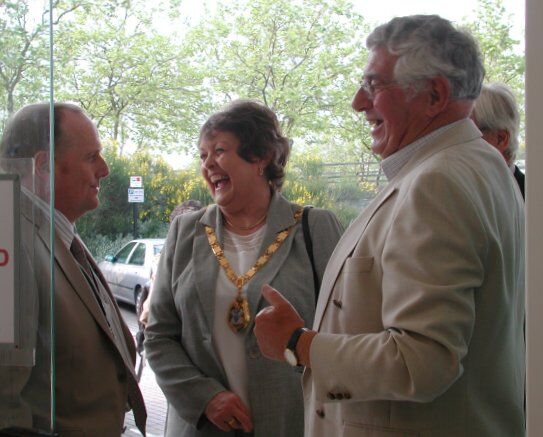




No Comments
Add a comment about this page